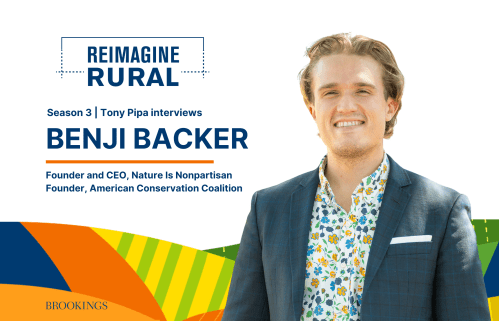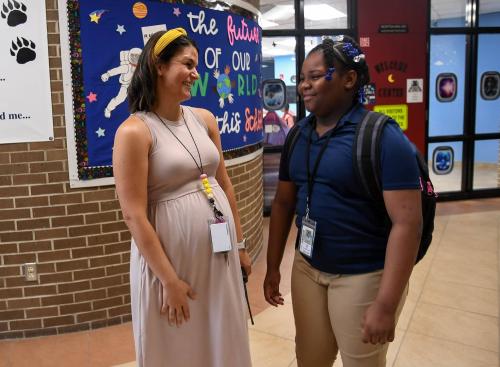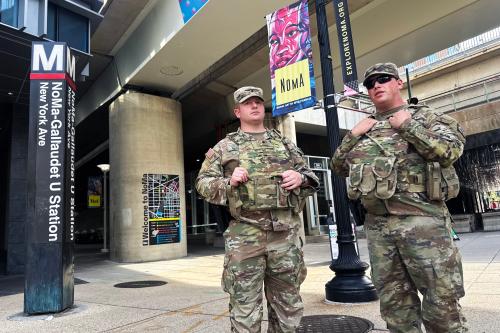Many religious Americans, as well as many of those who are not affiliated with any religious tradition, celebrated Easter yesterday. It is at such moments that we are reminded of the essential role religious voices have played throughout our history. From the anti-slavery movement, to Theodore Roosevelt’s Progressive Party agenda, to the civil rights movement, Americans of faith have inspired and animated many movements for social reform.
In a major new report to be released on Thursday, April 24, Brookings senior fellows E.J. Dionne and William Galston, along with Ross Tilchin and I, trace the history of the religious progressive movement in the U.S. and examine some of the challenges and opportunities the movement currently faces.
Two such challenges are the decline in formal religious affiliation, particularly among the young, and the bad rap religion has gotten as a result of the culture wars and the prominence of conservative religious figures. Research by Robert Putnam and David Campbell as well as the Pew Forum on Religion and Public Life, suggests that these phenomena are related. “[M]illennials have only known a world in which religion and the right are intertwined,” wrote Putnam and Campbell in a 2012 Foreign Affairs piece. Young people associate religion with intolerance and homophobia, and therefore they do not see themselves, or wish to be seen, as religious.
Young Americans today are less affiliated religiously than any previous youth cohort in history. The Public Religion Research Institute has found that 35 percent of Americans under age 30 are unaffiliated. One-in-five 18 to 29 year olds say that religion is not important in their lives, compared to only 10 percent of those 50 and older who say that. A study by the Pew Forum notes that the only religious group in the U.S. that is growing is the religiously unaffiliated.
Nevertheless, we argue that despite growing secularization, particularly among the young, religious voices will remain essential to movements on behalf of the poor, the marginalized, and middle-class Americans. The religious right spoke to the country’s worries about social change. The religious progressive movement speaks to the country’s desire for economic change. The persistence of poverty, the decline of social mobility and rising inequality all demand new departures in policy and politics. There is wide room for social action but there is no consensus on what form new approaches to poverty, mobility and opportunity should take.
This is the task the progressive religious movement must take on, for while people of faith are generally supportive of government programs to help the poor and provide equal opportunity, the religiously unaffiliated support such policies even more strongly. Just as the civil rights movement was inspired simultaneously by the Declaration of Independence and the Bible, by labor unions and the African-American church, the struggle for economic justice can find inspiration from religious and secular voices.
As we note in our report, Pope Francis is one religious figure who seems to perceive that a focus on social justice and inclusion offers a more promising path to engaging the energies and allegiances of the new generation than does a continuation of the culture wars. In his widely cited ecumenical, Evangelii Gaudium, he wrote:
There are Christians whose lives seem like Lent without Easter. … The joy of living frequently fades … and inequality is increasingly evident. … [S]ome people continue to defend trickle-down theories which assume that economic growth, encouraged by a free market, will inevitably succeed in bringing about greater justice and inclusiveness in the world. This opinion, which has never been confirmed by the facts, expresses a crude and naïve trust in the goodness of those wielding economic power and in the sacralized workings of the prevailing economic system. Meanwhile, the excluded are still waiting. … While the earnings of a minority are growing exponentially, so too is the gap separating the majority from the prosperity enjoyed by those happy few.
Americans of faith should do what they have done throughout American history and act as bridge-builders. As we suggest in our report, “Faith In Equality: Economic Justice and the Future of Religious Progressives,” Americans of faith should use their witness to build a movement for economic justice. But to do this, they must engage and partner with the unaffiliated.
For more information on the event and to register, visit the event page for “Faith in Equality: Economic Justice and the Future of Religious Progressives.”
The Brookings Institution is committed to quality, independence, and impact.
We are supported by a diverse array of funders. In line with our values and policies, each Brookings publication represents the sole views of its author(s).




Commentary
Economic Justice, a Movement of Faith
April 21, 2014